Sarah Boulton and Jodie Fisher* on their three year-old initiative to increase geoscience participation among females.
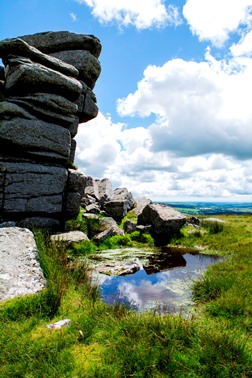 “My teacher told me that geology is not for girls”. No, not a comment from the 1950s but a recent statement from a potential undergraduate student attending a university open day. Surely young women’s aspirations are not still being squashed like this in the 21st Century? Well, it appears they are. But are we surprised that such attitudes persist, when the overall STEM workforce in the UK consists of only 14.4% women1? Or when physical sciences at university still attract <40% females2?
“My teacher told me that geology is not for girls”. No, not a comment from the 1950s but a recent statement from a potential undergraduate student attending a university open day. Surely young women’s aspirations are not still being squashed like this in the 21st Century? Well, it appears they are. But are we surprised that such attitudes persist, when the overall STEM workforce in the UK consists of only 14.4% women1? Or when physical sciences at university still attract <40% females2?
Picture - Dartmoor geology forms an integral part of GiG field work
A day to inspire
This got us thinking - what could we do? There are a number of excellent women in STEM initiatives; however, we didn’t know of any who were specifically targeting Earth sciences at the grass roots level. So, over coffee three and a half years ago, ‘Girls into Geoscience’ was born. We wanted to design a day to inspire and educate, as well as create a positive image of geoscience for women. Incorporating career aspirations and hands-on geology, we wanted to raise awareness and to encourage more females to take geoscience courses at university, by showing what is possible with a geosciences degree - and of course to show that ‘geology is not just for boys’!
Our Girls into Geoscience day is primarily aimed at Year 12 female students who are thinking about applying for university. We welcome all students interested in geoscience, whether they have studied geology, have some geological knowledge, or are completely new to the subject. Not limited to local schools and students, we also welcome a large number of individual students who have travelled long distances, as well as school groups (local and not so local) with accompanying teachers (see map, below right). We hope to engage the teachers as much as students, as they are the ones who are in a position to inspire the next generation. We want teachers to learn new geological skills and refresh their knowledge, as well as to take back our message into their schools and spread the geological word.
June 2014 saw the first Girls into Geoscience day, with 65 girls and five teachers attending. The morning session consisted of a diverse range of talks on petroleum geology, engineering geology, academia and life aboard an Integrated Ocean Drilling Program (IODP) drilling ship. The aim of these talks is to showcase a range of career pathways, and we endeavour to invite early-career female geoscientists from industry and academia, as well as more experienced scientists. Girls are able to network with the speakers over lunch, as well as to talk to staff and current female students studying Earth sciences at Plymouth University. Campus tours are also offered to anyone interested in seeing more of the university facilities, and our specialist Earth science laboratories.
Workshops
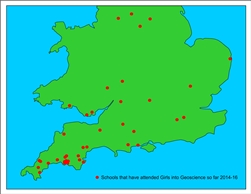 In the afternoon, an insight into the university experience is given through hands-on workshops run by female PhD students, postdoctoral researchers and academic staff. Four workshops are offered on a range of topics from applied volcanology and hazards, to subsurface geology. Students may participate in any two of four available workshops. The attendees really appreciate this option to focus on their interests, and it is all part of our ethos to run the day in the style of an academic conference.
In the afternoon, an insight into the university experience is given through hands-on workshops run by female PhD students, postdoctoral researchers and academic staff. Four workshops are offered on a range of topics from applied volcanology and hazards, to subsurface geology. Students may participate in any two of four available workshops. The attendees really appreciate this option to focus on their interests, and it is all part of our ethos to run the day in the style of an academic conference.
Map: Geographical spread of students attending
The success of this event led to a second in 2015, and a third in 2016. In 2016 we wanted to offer an even fuller geological experience, and so decided to offer a field trip, to demonstrate that there are no barriers to female inclusion in the field - something previous attendees had requested. Utilising Plymouth’s amazing local geology, we ran the excursion to Dartmoor National Park on Sunday 3 July 2016. We introduced students to field observation, description, and recording of geological materials and contacts. Accessible for those who had done fieldwork before, as well as those who hadn’t, we ensured each student was able to learn some new skills and get to grips with geology in the field. We were lucky with fantastic weather at both locations (Great Staple Tor and Burrator Quarry), with 30 students and two teachers attending.
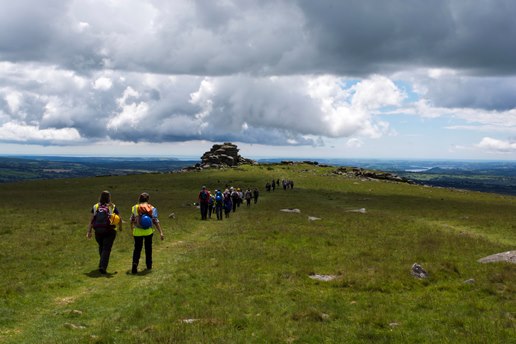 The excursion was followed on Monday by morning talks and afternoon workshops, as in previous years, with 80 students and 11 teachers attending. The morning talks gave a fascinating insight to real geological careers, with talks from Claire Jennings (Aquageo) on marine geology and seismic acquisition, Dr Kathryn Hadler (Grinding Solutions/Imperial College London) on mining and mineral processing and Dr Michelle Harris (Plymouth University) on hydrothermal systems and ocean drilling.
The excursion was followed on Monday by morning talks and afternoon workshops, as in previous years, with 80 students and 11 teachers attending. The morning talks gave a fascinating insight to real geological careers, with talks from Claire Jennings (Aquageo) on marine geology and seismic acquisition, Dr Kathryn Hadler (Grinding Solutions/Imperial College London) on mining and mineral processing and Dr Michelle Harris (Plymouth University) on hydrothermal systems and ocean drilling.
Meteorite
Following lunch and the university tours, the afternoon workshops included a chance to examine meteorites in hand specimen, and thin sections of martian, lunar and asteroidal rocks; to get to grips with geological time; understand how microfossils can be used to interpret past climate change; and to investigate the surface rupture of the 2010 Darfield Earthquake (New Zealand) using GoogleEarth.
This year we also offered school groups the opportunity to stay overnight in hall. This was a help to those coming from further afield, but it also allowed potential students see student accommodation first-hand, and gave them a fuller impression of the university experience.
We have been able to reflect on each event with the help of feedback from students and teacher attendees. Feedback is the key to monitoring the impact of the Girls into Geoscience programme, and to adapting the event to students’ desires and expectations. This year for the first time we will also be following attendees through their university application process, to monitor if, and how, attending Girls into Geoscience may have shaped ideas about geoscience, and studying it at university.
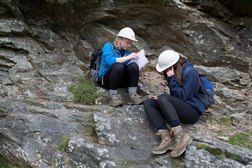 At Plymouth we currently have two enrolled students who attended the 2014 event, as well as eight further applicants to geology and geography degrees. From the 2015 event we have received four applications (and two acceptances), and we hope to welcome more from among the 2016 cohort. This year’s feedback showed that all the students enjoyed the day; 75% said they would be more likely to consider doing geology as a degree as a result (only 16% said they weren’t going to consider geology, and the other 9% had already wanted to do geology), while 54% said they would be more likely to consider studying Geology at Plymouth University.
At Plymouth we currently have two enrolled students who attended the 2014 event, as well as eight further applicants to geology and geography degrees. From the 2015 event we have received four applications (and two acceptances), and we hope to welcome more from among the 2016 cohort. This year’s feedback showed that all the students enjoyed the day; 75% said they would be more likely to consider doing geology as a degree as a result (only 16% said they weren’t going to consider geology, and the other 9% had already wanted to do geology), while 54% said they would be more likely to consider studying Geology at Plymouth University.
Free
We offer this two-day workshop free of charge, through the generous support of the School of Geography, Earth and Environmental Sciences, and the University of Plymouth central outreach team. We have also been lucky to receive some sponsorship and funding from BP, the Micropalaeontological Society and the Royal Astronomical Society.
We hope to continue running this event for many years to come and with the next date set for 2 - 3 July 2017 (again featuring a day in the field and a programme of talks and workshops) we look forward to welcoming more girls to find out about the geosciences.
Girls into Geoscience is becoming more than just an event. It has become a network, supporting women in geology and those aspiring to be. Get involved!
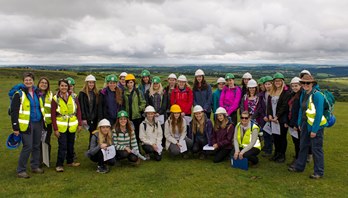
Find out more
To promote the event and our aims we have set up a very active twitter account (@girlsingeosci) and a blog (https://girlsintogeoscience.wordpress.com/) promoting geoscience to girls and profiling women in geoscience who are willing to share their stories and give advice on how they achieved their career goals.
See also www.plymouth.ac.uk/whats-on/girls-into-geoscience.
Acknowledgements
To the whole Girls into Geoscience team without whom this day would not be possible. To Plymouth University for their support, and to The Micropalaeontological Society and the Royal Astronomical Society for their sponsorship of our workshops. Finally, to all of our speakers over the last three years for giving their time and expertise to our event.
References
Labour Force Survey April-June 2015, published by Office for National Statistics, August 2015. www.ons.gov.uk/employmentandlabourmarket/peopleinwork/employmentandemployeetypes/datasets/employmentbyoccupationemp04 [accessed 17/08/16] Equality change unit, 2015. www.ecu.ac.uk/ [accessed 17/08/16]
*Plymouth University. Contact Sarah Boulton E: [email protected]
Save